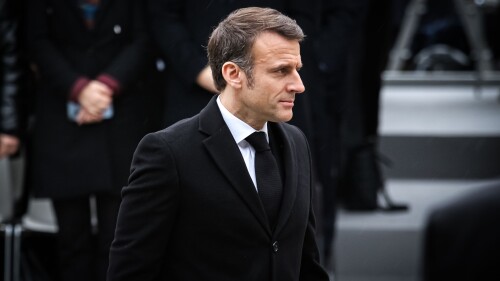Montargis, 15,000 inhabitants, 68 miles south of Paris, will refuse on Friday to celebrate the National Holiday of France, Bastille Day — no fireworks, no street balls. Instead, a brief ceremony will take place to thank the police forces and the fire brigade who rescued the town two weeks ago from riots fueled mostly by Muslim immigrants.
“Three hundred thugs, coming out of nowhere, stormed the inner city. They burned several houses to the ground,” Mayor Benoît Digeon said. “The population had to be evacuated to safer areas.”
Under normal circumstances, Montargis would be described as a touristic “inland Venice,” both for its historic architecture and its many bridges on the Loing River, the Briare Canal and some lesser rivulets. It attracts many Chinese visitors, since, in the early 1920s, Deng Xiaoping, who would go on to rule China between 1978 and 1989, intermittently worked at a local shoe factory.
“Three hundred thugs, coming out of nowhere, stormed the inner city. They burned several houses to the ground.” - Mayor Benoît Digeon
Today, another comparison comes to mind: Oradour-sur-Glane, the martyr village in South-West France that was mercilessly destroyed by a German SS division in 1944 and never rebuilt. “We are looking at blackened walls in the very heart of our city, and we don’t understand,” some inhabitants told the press. “What is going on here? Is this war?”
The head of France’s Directorate General for External Security between 2002 and 2008, and then an envoy to Israel and Hungary, Pierre Brochand, thinks that, indeed, “the nation’s life is at risk.” He confided to the conservative newspaper Figaro the other day, “This is a turning point in our history.”
According to Monsieur Brochand, the present “third world” Muslim immigrant community has reached a “critical mass” which prevents it from assimilating into the French mainstream, as earlier immigrant groups had been able to do. On the contrary, France is developing into “separatist counter-communities” which eventually tend to challenge the democratic French nation-state with undemocratic “alternative sovereignties.”
“What we euphemistically call ‘urban violence’ is in fact a succession of tests of strength” M. Brochand notes. “We are happy not to focus on it... and to withdraw to happy privileged enclaves, quite similar to the ‘Green Zone’ in Baghdad...”
France was rocked by a first wave of rioting 18 years ago, in 2005, and then by eerie terrorist attacks in 2015 and 2016. The signals were misread, under both conservative and liberal administrations. Extensive budgets — for a total of $45 billion — were devoted to “urban renovation programs,” as if poverty were the issue.
France is developing into “separatist counter-communities” which eventually tend to challenge the democratic French nation-state with undemocratic “alternative sovereignties.”
Ironically, the lavish facilities built within this framework — from schools and libraries, to sports facilities and transportation networks, to hospitals and police stations — were the prime targets of the 2023 riots.
By contrast, the crucial issue of an unchecked, vast, culturally alien, and disruptive immigration was ignored. Five million new immigrants were admitted since 2005. It is estimated that 250,000 legal immigrants and another 250,000 illegal immigrants are currently settling in the country every year.
About 70 percent come from the Muslim countries of North Africa, West Africa, and the Middle East. Since their fertility rate is much higher than the French average, their share of the population is steadily growing among the younger generations. In urban areas, between 30 percent and 50 percent of the boys and girls under 20 stem from Muslim countries.
Numbers of Muslim immigrants are willing to assimilate into French society as law-abiding and professionally successful citizens and to internalize French culture. Even more remarkably, some of the best current French critics of radical Islam or wokeism are first or second-generation Muslim immigrants.
The present unchecked immigration, though, is bound to benefit the separatist, anti-French, or anti-Western immigrants over the patriotic, pro-French and pro-Western ones.
The question is: How come the French elites have been unable to cope with the facts on the ground? The “big business” explanation, according to which big companies need third-world immigrants as a cheap manpower, does not make sense in France.
For two reasons at least: the welfare state is so extensive as to turn away immigrants from salaried jobs; the big companies tend, no matter what, to outsource their production and services to the very countries from which third-world immigrants are coming.
The present unchecked immigration, though, is bound to benefit the separatist, anti-French, or anti-Western immigrants over the patriotic, pro-French and pro-Western ones.
A much more convincing explanation is the spread of anomie and the abandonment of traditional Western, Jewish, and Christian values among the native French. Christianity is in bad shape, as a little more than 30 percent of all French babies are being christened, against about 70 percent only a generation ago.
Family and marriage are disintegrating. Public elementary and high-school education is collapsing. National and democratic loyalty have been undermined by a global transfer of sovereignty to the European Union.
Many of the French, including many of the first-tier French, are thus in a state of deep ethical and identity confusion. They are simply not equipped, for the time being, to deal with the rise of more assertive alien cultures, even next door.
One of France’s most distinguished criminologists, Alain Bauer, is warning: “If we don’t act immediately, I can think only of two scenarios in the future. Either France will turn into some kind of a failed country, like Haiti, with rampaging private armies fighting each against the other. Or it will turn into an authoritarian Chinese-style regime.”
Indeed, the restoration of state authority may be seen now in France as an immediate priority. The latest available polls show that Marine Le Pen and the National Rally are more likely to be trusted in this respect than President Macron or any other leader, right or left.








